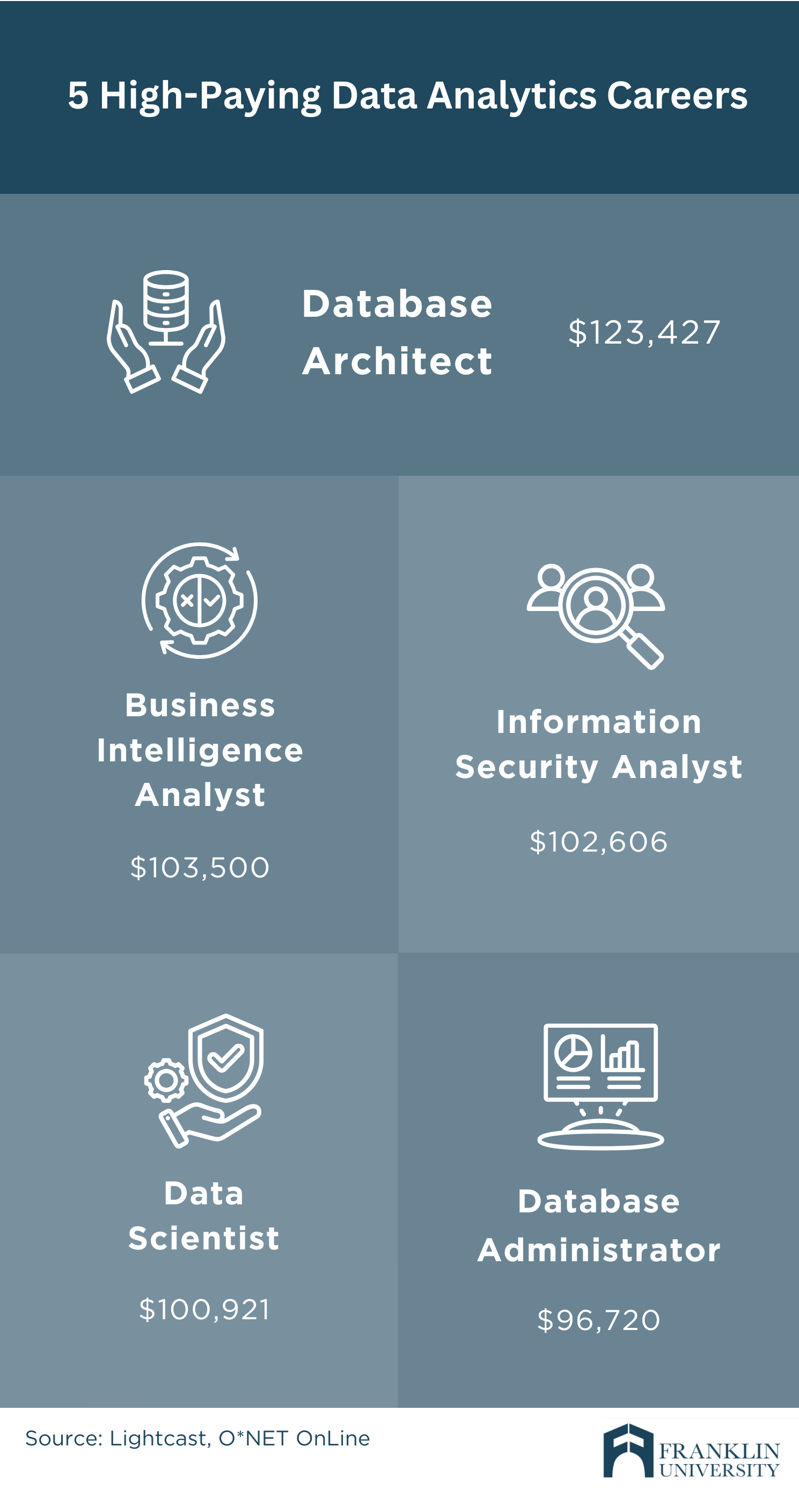Request Information
We're Sorry
There was an unexpected error with the form (your web browser was unable to retrieve some required data from our servers). This kind of error may occur if you have temporarily lost your internet connection. If you're able to verify that your internet connection is stable and the error persists, the Franklin University Help Desk is available to assist you at helpdesk@franklin.edu, 614.947.6682 (local), or 1.866.435.7006 (toll free).
Just a moment while we process your submission.

Master’s Data Analytics Salary: How Much Can I Expect to Make?
These days, volumes of hard-to-manage data are found within and behind almost every business entity. Known as “big data,” it is literally changing the way businesses drive organizational growth and success.
With the explosion of connected devices (known as the Internet of Things or IoT), organizations now have access to massive amounts of information. This information is a valuable commodity, coming in the form of data points about customers, competitors, products, consumer behavior and so much more.
By itself, data is useless. Data only becomes valuable when it’s translated into meaningful information. That’s why there’s a growing need to not only capture data, but also process it. Data, when analyzed and applied correctly, empowers companies to make smarter, more strategic and proactive decisions.
That’s where data analytics professionals come in. Data analysts are crucial to helping organizations transform big data into actionable business intelligence.
Keep reading if you’re looking for your own insights on how to get ahead–and earning a high-paying salary–in this in-demand career field.
What’s the Real Value of a Master’s In Data Analytics?
It wasn’t that long ago when the term “big data” was unheard of. And like other emerging trends (internet, anyone?), big data has become big business, too.
So, for those looking to capitalize on an exciting and changing field, earning a master’s in data analytics is a great place to start.
Why should you get a master’s degree in data analytics?
- Expertise: A data analytics master’s can help you develop the skills required to collect, process and visual data so companies can solve their most complex business challenges.
- Salary Potential: Earning a master’s can significantly elevate your salary and lifetime earnings. According to the NACE 2022 Salary Survey, computer science graduates with only a bachelor’s degree can expect an annual average salary of $75,900 whereas those with a master’s degree can expect to take home $82,384 a year.
- Job Growth: Data careers are skyrocketing at an astounding rate. According to the U.S. Bureau of Labor Statistics (BLS) the job outlook to 2031 is very good–and growing. In fact, with a 36% growth rate, this is a career that’s expected to grow much faster than the 3% project growth rate for all occupations.
- Employer Demand: Master’s degrees are fast becoming the new norm in the field of data science and analytics. A master’s degree (or higher) is becoming a competitive advantage for professionals in this field. According to Lightcast, 30% of job postings for data scientists require a master’s degree and 11% require a Ph.D. or professional degree. This means almost half of the professionals in this field are expected to have an advanced degree.
6 Signs You’re Ready to Earn a Master’s in Data Analytics
When it comes to your career, how much you make is important. That being said, salary isn’t everything. So, before you look at earning a data analytics master’s to launch or further your career and your earnings, take a minute to check yourself.
.png)
Get a FREE roadmap that includes insider information to help you maximize the many opportunities in the fast-growing field of Big Data.
Here are six key indicators that can help you decide if you’re ready for the degree–and the career.
1. You enjoy math and statistics.
The foundation of data analytics is using math concepts and statistical methods to tackle complex data problems. While you don’t need a specific undergraduate degree to pursue a master’s in data analytics, it can help to enjoy math and statistics. Many students with a background in science, technology, engineering and math (STEM) gravitate toward this field of study and, naturally, are the most prepared for the rigors of a master’s degree in data analytics.
Keep in mind that the field heavily relies on quantitative analysis. So, if you enjoy working with numbers and deriving insights from data, a career in data analytics might be right for you. And because data analytics involves solving real-world problems using data-driven approaches and statistical methods, such as regression analysis, hypothesis testing, data modeling and visualization, having a passion and aptitude for math and stats is ideal.
2. You’re good at identifying patterns and noticing trends.
A career in data analytics means you’ll spend a lot of time finding patterns and trends within large datasets, deriving insights that are of value to your organization. Being good at identifying patterns means you’re likely to excel at recognizing relationships and correlations within the data–and that can help you uncover relevant and meaningful information that can drive decision making.
Do you enjoy solving puzzles by recognizing patterns? Are you good at making predictions based on a pattern or trend? If so, with a data analytics master’s, you’d have the in-demand skills organizations need to help them optimize processes, improve customer experiences, and identify growth opportunities.
3. You’re into computer programming.
Computer programming is an essential skill for a data analyst. While not every data analyst needs to be an expert software developer, it definitely helps to have a solid understanding of programming. Computer programming skills can empower you to work more efficiently, perform more complex analyses, and gain deeper insights from data. Also, data analysts with programming proficiency often make a significant impact in their work while also remaining competitive in the rapidly evolving field of data analytics. Python and R are two popular programming languages in the data analytics community, primarily due to their extensive libraries, community support and versatility. Other programming languages like SQL and Java, however, have value, too, depending on the specific tasks and data environments involved.
4. You tend to back up your claims and opinions with data.
Although anecdotal stories are often interesting and helpful in just about every industry, the truth is, good decisions are always rooted in insights derived from data. If you’re someone who values data, likes data-driven decisions (even when they’re tough), and is skeptical about consuming information without seeing the evidence provided by data, then it’s highly possible you’ll like this field. By their very nature, data analysts are inquisitive and have a keen eye for detail. So, if you have a curious and analytical mind, there’s a very good chance you’ll enjoy exploring data, discovering patterns, and drawing meaningful conclusions from it.
5. You like working in cross-functional teams.
Data analysts play a pivotal role by providing data-driven insights in support of decision-making across an organization. Working in cross-functional teams is vital for data analysts because it provides an opportunity to collaborate with diverse professionals, understand an organization's business landscape, and contribute data-driven solutions in response to real-world challenges.
Plus, effective teamwork enhances the impact of data analytics and increases the value data analysts bring to the organization. So, if you enjoy working in diverse teams, you’ll grow as a professional, too, gaining domain knowledge in specific areas, understanding business problems from varying perspectives, improving the quality of data being used, and supporting a culture of innovation.
6. You love learning new things.
The field of data analytics is ever-evolving, with new methodologies, tools and technologies regularly emerging. (That equates to a dynamic and rapidly growing job market.) If you love to learn about new technologies, as well as the domain knowledge of new industries or new projects, the field of data analytics is wide open to you. As someone who thrives on continuous learning, you’ll probably enjoy the fact that data and patterns continuously change, creating all-new problems for you to solve. Remember, a good data analyst is always hungry for new knowledge and new skills.
Master’s in Data Analytics: 5 Top-Paying Jobs
Time to get to the good stuff: The high earning potential of a career in data analytics. Here’s a look at five of the highest-paying job titles you can get with a master’s in data analytics.

1. Database Architect
A database architect designs, structures and maintains data, ensuring that data is accurate and accessible for other members of the organization or project team.
Job Responsibilities:
- Create strategies and processes for each division of the enterprise data model
- Collaborate with business leaders and IT partners to plan a holistic data strategy
- Develop and maintain storage of all data architecture outputs
Median Annual Salary: $123,427
2. Business Intelligence Analyst
A business intelligence analyst identifies data patterns and trends and generates custom reports to inform business decision making.
Job Responsibilities:
- Extract and analyze data and synthesize trend data to support proactive planning
- Report on analytics and their financial impact for a variety of data-driven projects
- Develop business tools and systems, such as databases, spreadsheets and outputs
Median Annual Salary: $103,500
3. Information Security Analyst
An information security analyst helps increase network and internet security by assessing vulnerabilities and recommending mitigation strategies.
Job Responsibilities:
- Ensure appropriate security policies, processes and controls
- Safeguard electronic infrastructure and digital files
- Conduct security testing, forensic investigations and propose mitigation measures
Median Annual Salary: $102,606
4. Data Scientist
A data scientist collects information from a variety of sources and consolidates and analyzes it to better understand business performance. They also build artificial intelligence (AI) tools to automate certain processes so others can easily access and manipulate data for better decision making.
Job Responsibilities:
- Mining data using cutting-edge methods
- Processing, cleansing and verifying data integrity for accurate analyses
- Using machine learning techniques to build and optimize data models
Median Annual Salary: $100,921
5. Database Administrator (DBA)
A DBA acts as a leader within computer engineering teams to develop database architecture that accomplishes the goals of specialized computer programs.
Job Responsibilities:
- Design, plan and build databases to meet business requirements
- Write and troubleshoot complex database procedures
- Spur innovation by developing new strategies and processes
Median Annual Salary: $96,720
Data Analytics: Choosing the Right Master’s Degree Program
Now that you know what kind of opportunities, growth and, most importantly, income you could earn with a master’s in data analytics, it’s time to take the next step: Find the right M.S. in Data Analytics degree program for you.
So, when choosing your master’s program, make sure to look at the quality of the program, the real-world experience of the instructors and whether it aligns with your goals.
Keep in mind that if you’re a busy, working professional, the best way to make sure you finish your master’s degree in data analytics is with an applied, hands-on master’s program that will give you best-in-class, practical skills that you can use now while you learn as well as use in your future career.
Still have questions? Find answers about getting a master’s degree in data analytics here.





